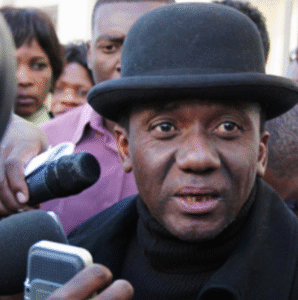PATRIOTIC ALLIANCE TAKES XENOPHOBIC STAND AT LIMPOPO RIVER BORDER

In a controversial move that has sparked widespread debate, Gayton McKenzie, leader of South Africa’s right-wing Patriotic Alliance (PA), has led a group of party members in an aggressive anti-immigrant campaign at the Limpopo River, the natural border between South Africa and Zimbabwe. This action underscores a troubling rise in xenophobic sentiments in the region.
The Limpopo River, which forms the Beitbridge border, became the unexpected stage for this political drama during the festive season. McKenzie and his followers camped out at the river, engaging in what they considered a vigilante mission to prevent undocumented individuals from crossing into South Africa. Their approach was straightforward and unapologetic, as they shouted “Abahambe” – a term in Nguni languages meaning “they must go” – at those they encountered trying to cross the river.
McKenzie’s actions did not occur in isolation. In a bid to publicize their campaign, he and his deputy, Kenny Kunene, posted several videos on social media platforms. These videos show them and other party members confronting groups of people at the riverbank, some of whom were carrying small boats to cross the crocodile-infested waters.
The backdrop to this situation is complex and deeply rooted in the regional history. Zimbabweans have been crossing into South Africa for generations, driven by various reasons. However, the scale of this migration has intensified due to Zimbabwe’s severe economic and social crises. The country’s economy has been in a state of collapse, exacerbated by leadership and policy failures under the late former President Robert Mugabe and his successor, President Emmerson Mnangagwa. This economic meltdown has forced millions to flee, seeking refuge and opportunities in neighboring South Africa and beyond.
McKenzie’s stance, however, does not acknowledge these underlying issues. Instead, his actions reflect a surface-level understanding of a much more complex problem. He claims that his party has intercepted nearly 1,000 Zimbabweans attempting to cross into South Africa, a statement that underscores his determination to maintain this campaign.
The PA leader’s rhetoric also taps into a broader narrative of lawlessness and government inaction. In his statements, McKenzie questions the absence of police, traffic officials, and the South African National Defence Force (SANDF) in managing border security. He even recounts an altercation with a local farmer over water use, highlighting the tensions and complexities at play in this border region.
McKenzie’s campaign, while presented as a measure to control illegal immigration, is fundamentally xenophobic. His actions and those of his party members target a vulnerable population fleeing economic hardship and political instability. Moreover, the PA’s approach oversimplifies a multifaceted issue, reducing it to mere vigilantism without offering any constructive solutions.
This incident at the Beitbridge border raises important questions about the role of political leaders and parties in addressing immigration and border security. While national sovereignty and border control are legitimate concerns for any country, the manner in which these issues are approached and resolved is critical. The PA’s actions, driven by xenophobia and a lack of empathy for the plight of migrants, do little to contribute to a meaningful dialogue or solution.
In conclusion, the events at the Limpopo River border reflect a troubling rise in xenophobic attitudes in South Africa, particularly among certain political factions. It underscores the need for a more nuanced and compassionate approach to immigration policy, one that considers the human element and the complex factors driving migration. As South Africa grapples with its own challenges, the response to migration and border control will continue to be a critical issue that demands thoughtful and humane solutions.



